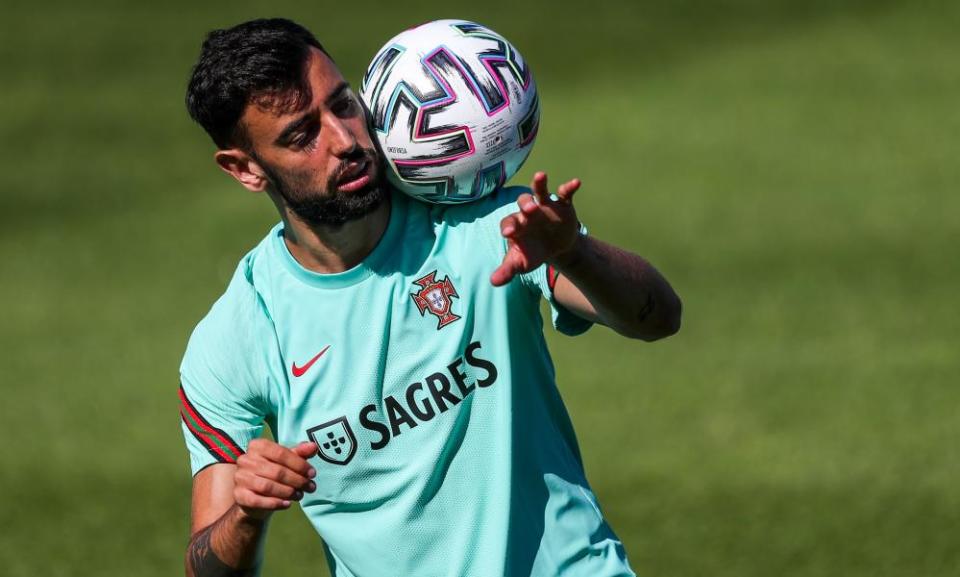Bruno Fernandes: how aptitude plus attitude equals transformative magic

At various points in our life, we get to simulate something of what it takes to be an elite footballer because we are invited to perform under pressure – with frequently hilarious results. These events do not occur in front of a massed crowd and global audience, so our grasp of how it feels and what it takes remains conceptual at best: though we understand skills and competing are difficult, the cognitive process of executing them in front of the world is unfathomable because it requires a brain very different from the norm.
Few fit that description better than the one owned by Bruno Fernandes. When he signed for Manchester United, his credentials were besieged by buts: but he’s still in Portugal at the age of 25; but no one else is in for him; but he’s too cheap to be proper and too expensive to be a punt; but he’ll never replicate his Sporting numbers. Nor was there scope for him to settle in or be merely very good – transformative brilliance was necessary immediately. So transformative brilliance was what he brought.
Related: How Portugal became a European super power in football | Andy Brassell
Footballistically speaking, this was thanks to a mind-boggling aptitude for what tacticexperts will surely come to know as “making goals happen”. Whether with dink, drive, sweep, scuff, tap-in, header, volley or half-volley, Fernandes is a superb finisher, sharp enough to run in behind, quick enough to keep up with counters and calm enough to dispatch penalties, free-kicks and one-on-ones. And he is an equally adept provider, just as liable to invent an angle, find a pass and pick a cross as he is to apply chip, dummy, flick or poke.
As such, Fernandes spent this past season creating more chances than any other Premier League player and providing more goals and assists than any Premier League player bar Harry Kane. In Europe’s five richest leagues he was behind Kane, Erling Haaland, Robert Lewandowski, Kylian Mbappé and Lionel Messi – a ludicrous state of affairs for any midfielder, never mind one who tears about the pitch like Billy Whizz on speed.
It is true that Fernandes has played a lot of games – since signing for United he has featured in six more than any other player in those five leagues – but this reflects his physical and mental robustness. “When I was a kid I played maybe seven or eight hours a day,” he says. “So, to play 90 minutes every three days or two days is not enough for me.”
The blitheness of this explanation neatly encapsulates his standards – no excuses for failure – and his attitude – no slacking, ever. “I don’t know if I’m the most competitive but I think no one is more than me,” he said of his United teammates.
“Always in my mind, you can have the same as me but you can’t have more than me.” Or, put another way, the pressure put on him by others is nothing compared with the pressure he puts on himself that, thanks to that brain, he can sublimate into drive.
This ability is of especial use when deploying what Peter Schmeichel calls “risk mode”: the phase of the game when a champion but trailing team abandon tactics, formation and all the usual regimens in order to pursue victory. There is no fear of losing by more, nor of the embarrassment a heavier defeat might entail – every move, decision and feeling is positive, with nothing held back.
What is unusual about Fernandes is that for him this is the state of nature and means that even when playing badly there’s a chance he’ll find a decisive piece of quality. Though his perpetual motion affords him more opportunities than most, the key element is the unswerving focus and unwavering belief that means he never lets himself off, trying difficult things regardless of how many times they’ve failed previously and ignoring the consequent agitation.

Demanding the highest standards of himself entitles Fernandes to demand them of others. His impact at Old Trafford has provoked understandable comparisons to Eric Cantona, but to Cantona’s leadership by example Fernandes adds exhortation and confrontation, always wanting better and more.
The New Zealand rugby union team have a famous “no dickheads” rule management use to govern selection – a compelling soundbite, but in need of an “off-the-pitch” qualification. On it, they are not only acceptable but essential: players who tolerate neither indolence nor incompetence, who teammates are desperate to impress, who are good enough and articulate enough to speak their minds, who despise losing more than they adore winning, who are disliked by all except those who know them. In that sense, Fernandes is not Cantona, he is Roy Keane.
Yet there remains an argument that he is unworthy of either comparison, because in the tensest games he is yet to perform – he has lost three semi-finals and one final with United. Naturally, this is not lost on him, and as such, he regards another much-improved season – another personal triumph – as a failure.
Now, though, he has a chance to redeem at least part of that, with a Portugal team more relaxed than ever, having finally won a major tournament. Except Fernandes’s brain being Fernandes’s brain, he will doubtless appraise a squad superior to that of 2016, with a trophy to defend and him in it, making winning neither an option nor even an expectation, but an obligation. AWhen such talent meets such mentality, definitive performances under pressure are not just imaginable but inevitable.

 Yahoo Sport
Yahoo Sport 





































